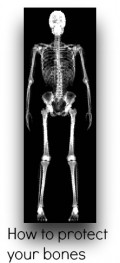Health Supplements for Vegetarians; Do You Need Supplements?
The short answer is no, if you eat a healthy, balanced vegetarian diet, you do not need to take health supplements such as multivitamins.
The long answer will take up the rest of this hub.
In reality, whether you need health supplements on a vegetarian diet or not depends on several factors.
The first factor is what type of vegetarian you are.

Types of Vegetarians
The most common type of vegetarian is the "ovo-lacto vegetarian." Ovo-lacto vegetarians eat eggs and dairy products but no meat or fish. Ovo-lacto vegetarians and their related types, ovo-vegetarians and lacto-vegetarians, receive all the nutrients their bodies need from their diets and do not require any additional supplementation.
So-called "semi-vegetarians" (who eat some meat) and "pescetarians" (who eat fish but not meat) are not real vegetarians. A better term for this type of eater is "flexitarian." Flexitarians also receive all the nutrients their bodies need and do not require any supplementation.
The final main type of vegetarian is the "vegan." Vegans do not eat any animal products at all: no meat, fish, eggs, or dairy products. Some vegans also avoid honey. Vegans do not receive all necessary nutrients from their diets and do require supplements or fortified foods.
How Healthy Is Your Diet?
When deciding whether to take supplements as a vegetarian or not, an even more important question than what kind of vegetarian you are is how healthy your diet is.
Many vegetarians gain a lot of weight because they replace nutrient-dense lean meats with heaping plates of white bread, white rice, white pasta, potatoes, and other nutrient-poor carbohydrates, topped off with generous helpings of cheese and other high fat dairy products.
Even worse, some vegetarians continue to consume lots of sugary soft drinks and processed foods - they're vegetarian, after all!
Needless to say, these are the kinds of diets that turn people into nay-sayers. If I had a penny for every time someone told me something like this - "I gained 20 pounds the first year I was a vegetarian and was ravenous all the time.... I feel so much better eating meat!" - I would be a very wealthy woman.
If your body is "ravenous all the time," that is its very clear way of telling you that you are not getting all the nutrients you need, probably because you're filling up on carbs, sugar, and other empty calories. Believe it or not, it is possible to be simultaneously fat and starving to death! If you catch yourself sliding into this common trap of new vegetarians, you need to either start taking supplements or reconsider your diet.
If, however, you already eat a relatively healthy diet, or you decide to use becoming vegetarian as an excuse to start eating one, you almost certainly will NOT require supplements.
My Favorite Vegetarian Cookbooks
A Healthy, Balanced Vegetarian Diet
So what does a healthy, balanced vegetarian diet really look like?
It includes plenty of:
- whole grains
- beans and legumes
- vegetables
- fruits
- (if ovo-lacto) eggs and dairy products
Avoid:
- meat, fish, and seafood (obviously)
- white breads, pastas, and other refined grains
- refined sugars, including table sugar and all corn syrups
- artificial sweeteners
- highly processed foods
- too much cheese
Important Nutrients for Vegetarians
- Protein. Many new vegetarians are very concerned about getting enough protein (that's part of the reason they tend to heap on the cheese) but the truth is, the average American eats nearly twice the recommended daily allotment of protein, and many nutritionists believe the recommended daily allotment is too high anyway. Consuming your normal amount of dairy products and eggs will be plenty of protein. If you're a vegan, replace animal protein sources with plant ones, such as beans and tofu.
- Calcium. Calcium is another nutrient that many new vegetarians worry too much about. Important as it is, the truth is that animal proteins inhibit the absorption of calcium, so when you become vegetarian or vegan, there's a good chance your calcium levels will improve! Even if you still eat dairy products, add plant sources of calcium such as leafy green vegetables to your diet.
- Iron. Iron is especially important for girls and women, due to monthly blood loss from menstruation. Fortunately, there are many good plant sources of iron, including leafy green vegetables, many beans and legumes, and soy products. Many cereals and bread products are also now fortified with iron.
- Omega 3 Fatty Acids. Many doctors will tell you to eat salmon and other coldwater fish to get your allotment of these heart healthy fats, but there are plenty of plant sources as well, including walnuts, leafy green vegetables, soy products, and canola oil. If you are an ovo-lacto vegetarian, consider switching to grassfed dairy products and pastured eggs, which have the highest amounts of Omega 3s and many other vitamins and minerals.
- Vitamin D. Dietary vitamin D is most easily absorbed from animal sources, so vegans should make a point of spending at least 15 minutes in the sun every day without sunscreen to ensure that they get enough. Other vegetarians should get enough from milk and eggs.
- Vitamin B12. Vitamin B12 only occurs in animal foods, so if you are vegan, you must take a supplement or eat fortified foods.
- The World's Healthiest Foods
My favorite nutrition site - The Vegetarian Resource Group (VRG)
Vegetarian recipes and nutrition information. The Vegetarian Resource Group (VRG) is a non-profit organization dedicated to educating the public on vegetarianism and the interrelated issues of health, nutrition, ecology, ethics, and world hunger. - Vegetarian Times - Great Food, Good Health, Smart Living
Vegetarian Times delivers simple, delicious food, plus expert health and lifestyle information that is exclusively vegetarian but wrapped in a fresh, stylish mainstream package that is inviting to all. - GoVeg.com: Vegetarian and Vegan Information
Your source for great-tasting vegan and vegetarian recipes, information on all aspects of vegan and vegetarian living, news about PETA's campaigns to stop factory farming, tips and free stuff to help you promote a vegetarian lifestyle.











